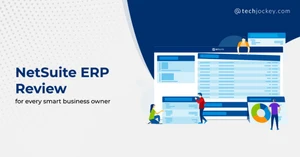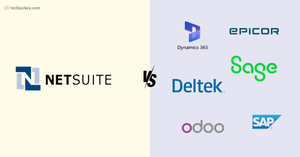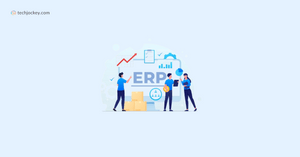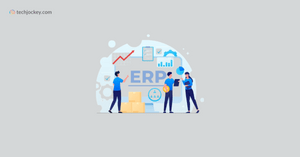What is ERP Software?
ERP software stands for enterprise resource planning software. ERP is a business process management that helps to automate workflow, increase accuracy, and efficiency of office functions like billing, inventory, purchase, technology, services & human resource management in an organization.
How Does ERP Work?
ERP software is integrated with organization computer systems and helps businesses in collecting, storing, managing, and interpreting data from their various units using a centralized database. It automates back-office tasks and streamlines workflows across departments. When optimized, the solution can drive efficiency, lower costs, and increase profitability. It promotes healthy collaboration in your organization, which is minimizing overhead costs, increasing productivity, decreasing redundancies, and more.
Cloud-Based ERP Systems
With Cloud ERP software as a service, you can use all its enterprise resource planning software functions online. Also, cloud based ERP requires minimal upfront cost, as there is no need to invest in computing resources and on-premise hardware.
Types of ERP Systems
There are three major types of enterprise resource planning (ERP) system. They are the following:
- On-Premises ERP: The enterprise resource planning system on the premises is exactly as its name suggests. The software is set up on the organization's servers and computer equipment. It is a system with a license that can be tailored and improved, usually managed by the company's IT team on the premises, to make the business process more efficient.
- Cloud-Based ERP: A vendor's servers host a cloud-based ERP system. This is the kind of ERP software that businesses can easily obtain through the Internet. One of the most financially feasible ERP systems is offered as a subscription model and requires shorter implementation time. Small businesses find cloud ERP to be ideal as the manufacturer charges a small fee for support, training, and updates.
- Hybrid ERP: A hybrid ERP software is a commonly chosen option by many medium-sized businesses for managing their daily operations. In this approach, ERP vendors offer businesses the choice to create fresh ERP modules and add unique features to their current ERP systems.
Key Features of Enterprise Resource Planning ERP Software
- ERP CRM: The CRM features of an ERP solution help organizations boost their customer service and profit per capita. It helps in managing leads, opportunities, and issues. The module provides you with a 360-degree view of your customers’ interactions with your company by consolidating their data, such as social media activity, purchase records, and past interactions. In an ERP, CRM works closely with the sales & marketing module to fast-track conversions.
- ERP Accounting: This accounting ERP solution features is a necessity of organizations and deals with accounting transactions like accounts receivable, payable, payroll, balances, and managing all assets.
- ERP Billing: ERP billing solution feature helps to generate online bulk bills, invoices, and track customer payments, revenue, manage customer complaints, and automate the payment reminders. It is efficient in areas like planning, material sourcing, production monitoring, and forecasting. Its key features include the ability to generate bill of material, shop floor control, a master production schedule, &, sales & distribution plan.
- ERP Inventory Management: This module is also known as a material management module. It helps businesses measure stock targets, manage replenishments, and perform other inventory processes. The module uses a product’s ID number to track and locate items in your inventory. This module is closely integrated with the Purchase module.
- Purchasing: The purchasing module manages the functions involved in material procurement. These include quotation requests, master production schedule, analysis, purchase orders, and stock updates. It functions closely with SCM & Inventory modules.
- ERP Financial management: This module of ERP software helps manage a business’s capital inflow and outflow. The module covers standard accounting transactions such as expenditure, ledger, bank reconciliation, balance sheet, tax management, and payments. It also generates financial reports for different departments
- HRM: The HR module comes with standard HRMS features such as attendance and time tracker, employee database and skills matrix. Some ERP tools also comes with performance trackers and payroll. The latter works closely with the financial management module
- Sales & Marketing: The sales & marketing module handles relevant workflows such as sales inquiries, sales orders, and invoices. A more advanced ERP solution also features taxation rules and shipping trackers. Sales and CRM modules work in tandem, ultimately to speed up the sales process and help the company in generating more profit.
- SCM: The supply chain management module covers key aspects including purchase order management. It helps in managing product flow from manufacturing to consumer and vice-versa (in case of returns or recalls). A key feature of this module is process automation, with which you can streamline your entire supply chain and makes it adapt to market shifts.
Benefits of ERP System
- Scalability: As your business grows, the ERP system adjusts & adds multiple features for enhanced functioning. You can incorporate new features, modules, and functionalities without interrupting your current processes.
- Mobility: You can access the ERP data anywhere & anytime. This degree of agility guarantees that decision-makers, staff, and teams can stay connected and efficient, irrespective of where they are located.
- Integration: Existing software in your organization can be integrated with an ERP system. ERP that you choose should work seamlessly with existing software in your business. An ERP that can easily integrate with existing infrastructure, improve functionalities, & ensure smooth file migration will help your business in the long run.
- Less Spending: Setting up an ERP system is relatively cheap with a base investment for hardware, software, & setup. The initial investment usually includes hardware, software, and setup, and it is often cheaper than managing individual systems for various business functions.
- Increases Efficiency: It integrates different business processes like accounting, marketing, sales, production and inventory into one platform. The software makes it easier to collect and access data, streamlining cross-departmental workflows, and maintaining accountability across the organization.
- Automation: ERP solutions also automate redundant day-to-day tasks like manual data entry & report generation. Automating such repetitive tasks frees your teams’ time and lets them focus on their core deliverables. For example, marketing can access daily web traffic data without the tech team’s assistance, or the accounting team can instantly access sales statistics without chasing the sales team. Online ERP software also gives managers the ability to perform quick lookups. Its intuitive dashboard allows managers to review key performance indicators across the organization.
- Promotes collaboration: Top ERP software breaks down communication walls between departments. Databases are easily shareable while workstations are connected. Such a setup allows teams to easily collaborate with each other using the ERP platform.
- Makes accurate forecasts: ERP’s reporting tools use filters and analytics to filter through data for inconsistencies. ERP software solutions also ensure that data updated is duplicate-free. With intact data integrity, report generation with realistic forecasts becomes easier.
- Business Intelligence: Advanced ERP solutions come with business intelligence tools that use machine learning and predictive analysis to dig deep into big data. Companies with large data sources can use ERP to gain hidden insights and stay competitively viable.
- Lower operational costs: ERP can also be used to cut down costs. When different processes are streamlined and metrics are easily monitored, delays, disruptions, and breakdowns can be anticipated & its impact better managed. ERP allows businesses in production, engineering, and other business units to work together using data obtained in real time & resolve problems faster. Operating costs are thus kept within budget.
- Increases data security: It has firewalls and controls to guard against data hacking and/or breaches. Having a single database means that access points are closely monitored, and security is concentrated. User permission rules can be defined, giving admins the flexibility to lock sensitive data and limit user access to information.
Top 10 ERP Systems
Here, is the list of 10 best ERP Systems. You can go through the link to learn more about the best ERP softwares:
| Top 10 ERP Systems |
| Software | Features | Pricing |
| Oracle Netsuit ERP | Financial management, Advanced reporting and analytics, cloud based | Custom Pricing is available |
| Biziverse | SCM, Inventory management, Sales and order management | ERP Starter: INR 1,800/year; ERP Gold: INR 6,000/year |
| Infor | HR management, Analytics and reporting, Industry-specific solutions | Custom pricing is available |
| ERPNext | Financial management, HR management, Project management, CRM | Small Business: Rs 4,100/month ; Enterprise: Custom Pricing |
| Tranzact | Procurement management, Supplier management, Spend analytics, Cloud-based | Micro Plan: ₹0, Small Plan: ₹5000/month, Medium Plan: ₹15,000/month, Enterprise Plan: ₹30,000/month |
| Microsoft Dynamics 365 | Sales & marketing automation, Cloud-based, Customer service automation | Custom pricing is available |
| SAP S/4 Hana | Real-time analytics, Advanced financial management, Cloud and on-premise, SCM | Custom pricing is available |
| OneStop | Inventory and supply chain management, Order management, Reporting and analytics | Diamond: ₹3,000/year, Platinum: ₹7,000/year, Enterprise: ₹11,000/year |
| Epicor | Manufacturing management, Financial management, HR management | Custom pricing is available |
| Odoo ERP | Financial management, CRM, Inventory and SCM, Modular design | One App: ₹0, Standard: ₹580/user/month, Custom: ₹890/user/month |
Things To Consider Before Buying ERP Software
- Upgrade vs Replacement: If you already have an ERP system, evaluate if you need to get a new one or just an upgrade. Most ERPs today can be simply integrated with a new module, with existing applications. This way, you can minimize costs & disruption. But if your existing ERP solution is ten years or older, it’s a wise choice to replace it. You can use today’s ERP for scalability, integration, and deployment.
- Customization: Ensure that any ERP solution you choose, can work with your key business workflows. Go for an ERP that allows you to customize tools, localize dashboards and configure workflows. This will allow departments to define goals and use the ERP to improve their functioning.
- Budget: Purchasing ERP under a specified budget is highly essential. In this budget, make sure to include the buying cost and deployment cost. Make sure you are not buying too expensive ERP or too inexpensive for your business.
Ask for Free and Open Source ERP Software
Before you purchase an ERP system, ask the vendor for a trial run of the product or a free demo. This will allow you to be familiarised with the solution and better understand if it is suited for your business.

























.png?d=131x98)










